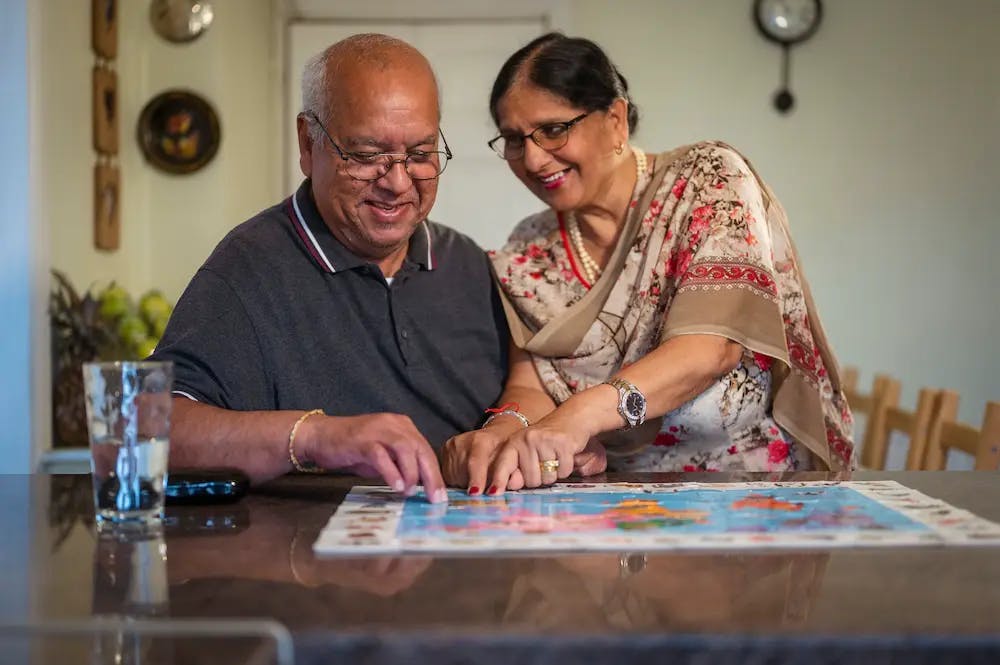What is Companionship Care and Why Is It Important?

Estimated Reading Time: 7 minutes
Loneliness affects many people in the UK, particularly those aged over 65. A common misconception surrounding home care is that it’s only for people who can’t live by themselves without assistance. Yet home care services - such as live-in care - are increasingly being aimed at supporting the emotional needs of older adults.
Here, we’ve explored what companionship care is, why it’s important and the benefits it offers.
Spend time with a friendly carer in your home
Browse the best companionship care in your area.
In this article on companionship care:
- What is companionship care?
- What can a companionship carer help you with
- The benefits of companionship
- How much does companionship care cost in the UK?
- How our care homes reduce loneliness
What Is Companionship Care?
Companionship care allows you to remain independent within your own home, while also being able to enjoy the company of a kind and warm carer throughout the week, who will become a trusted friend over time.
A companionship carer can spend as much or as little time with you as you wish - depending on how you're feeling. Some people need it for just a few hours a week, while others require several hours a day.
The companionship they provide could be as simple as sitting down with you and having a chat over a nice cup of tea and some biscuits. Or, a companionship carer could accompany you as you complete various errands.
This level of flexibility is a large part of what makes companionship care so popular amongst older adults.
What Can a Companionship Carer Help You With
Companionship carers are usually chosen following an assessment and meeting with them. Your loved one will need to tell the home care provider what their likes and dislikes are, along with what they’d like from a companionship carer. Though exact matches are often difficult to come by, a provider like MyLife Home Care will look at things like personality and interests to try and get as close as possible.
Companionship support offers emotionally-supportive conversations and social interaction, such as somebody to listen to your stories, ask about your day and share experiences with. There are so many things you can do with a companionship carer. You may wish to read a book and discuss it, play games, watch your favourite TV show, go for walks, get help with the weekly shop or simply have a much-needed conversation.
Companion carers can also prepare meals, do light housework and other domestic tasks if needed, along with provide transport to places such as social events.
We can help you find the best companionship care for you or your loved one. Request a free list of home care agencies, and our care experts will match you with suitable companionship carers with availability in your local area.
The Benefits of Companionship
As your loved one gets older, it’s important to remember that loneliness affects emotional and physical health alike.
Many older adults live alone and aren’t as active as they once were. With this in mind, companionship in later life helps people stay connected to society while feeling less lonely.
Below, we’ve highlighted four of the biggest benefits that companionship care services can provide.
Improved mental wellbeing
Arguably the biggest benefit is that it improves mental wellbeing while lessening the chance of depression. Older adults are at a greater risk of depression when lonely - which is why you, other family members and friends should try and reach out to them as much as possible.
Less isolation
If your loved one begins to isolate themselves from others, companionship carers can play a crucial role - making sure they keep in touch with others.
An opportunity to make new friends
Having companionship at home will help improve your loved one’s social skills. If they’re constantly around someone else, they’ll naturally feel more comfortable when interacting with others, making it easier to form new relationships.

Better cognition
It’s completely normal to be concerned that as your loved one ages, they may be at risk of cognitive decline. Research has shown that rates of Alzheimer’s are lower in people with busy social lives and good friends. This helps to illustrate that companionship services can stimulate the minds of older adults. In the process, they improve memory function and can even prevent the onset of dementia in your elderly loved one - similar to what takes place in a memory care home.
How Much Does Companionship Care Cost in the UK?
Companionship care is a form of home care. The cost of a home carer in the UK varies from service provider to service provider, but as a general rule, you can expect to pay between £15 and £30 per hour.
As an example, if a companionship carer cost £20 an hour and they visit your loved one for threeo hours every week, this will cost:
- £60 a week
- £260 a month
- £3,120 a year
In some cases, companionship care can be funded. It’s a good idea to speak with your loved one’s local council or Clinical Commissioning Group to see if they might be entitled to financial support.
How Our Care Homes Reduce Loneliness
We’re partnered with numerous amazing care homes that provide plenty of companionship. Residents can socialise with members of staff and fellow residents of a similar age.
Here are some of the ways that our care homes reduce loneliness:
A community feel
Care homes do a brilliant job developing a sense of community and belonging. Residents can take time out for themselves, but there’s always an opportunity to become part of a caring community, as encouraged by staff.

Activities and events
Care homes ensure there are numerous activities and events to keep residents entertained. Through these activities, residents can learn new skills or revisit their favourite hobbies.
Care homes in Brentwood such as Brentwood Arches have activities including arts & crafts, baking, gentle exercise classes, dance and gardening.
Meanwhile, care homes in Luton such as Mulberry Court Care Home offer residents activities like hair & beauty treatments, cooking, holiday celebrations and music classes.
Family visits
We understand the importance of residents and their loved ones being able to see each other. Though residents often form meaningful relationships with each other, family visits are encouraged as well. This will make residents feel happier while also bringing peace of mind to family members.
Explore The UK’s Best Home Care Agencies:
Use Lottie to find the best care agency in the UK by price, care types available (including comforting companionship care) and more:
Home care agencies in Liverpool
Home care agencies in Birmingham
Home care agencies in Milton Keynes
Home care agencies in Sheffield
Frequently Asked Questions
What’s the difference between a carer and a companion?
Though a companion can help out with various aspects of daily living - including simple tasks and chores around the home - their primary focus is to keep a person’s mind active while preventing social isolation. A carer - also called a personal care assistant - may provide all the support given by a companion, but can also offer qualified personal care, including bathing, dressing, using the toilet, help with eating and anything else that falls within this form of care.
What does companionship help with?
Having a companion in life - whether this is a carer, relative or friend - helps keep the mind active and prevents social isolation. Even if it’s just for a couple of hours every week, having somebody to speak with and share how they’re feeling can make a huge difference to your loved one’s emotional wellbeing.




